HISTORIC landmarks and AMAZING street art
Enjoy the famous “Philly” cheesesteaks or a soft pretzel while exploring these two outstanding walks in Philadelphia:
Historic Landmark Walk: Walk through the historic Old City District in Philadelphia, and immerse yourself in the heart of American history. Philadelphia was a central location for many pivotal events in the American Revolution and this is where the Declaration of Independence and the Constitution were signed. The city is home to historic landmarks such as the Liberty Bell and Independence Hall, but you don’t have to be a history enthusiast to enjoy this walk.
Mural Walk: Get to know more about the fascinating and diverse stories of this city, by exploring its vibrant street art. More than 4000 murals spread all over the city make Philidelphia the unofficial “Mural Capital of the World”. This second walk will take you through the Reading Terminal Market; the Magic Gardens, a mosaic wonderland; and the colorful and edgy South Street.
An In-Between Destination
Traveling back from Europe, we stayed in Philadelphia for a few days before heading to Georgia. I was looking forward to a little more stability in our living situation, so I wasn’t exactly thrilled about this “in-between” stay. However, Allan had some business in Philadelphia, and I decided to make the most of it. Who doesn’t like a Philly Cheesesteak and a soft pretzel anyway?
While we were gone, our car was in a storage facility, and when we picked it up, the catalytic converter had been stolen. So, another little setback but luckily an easy fix.
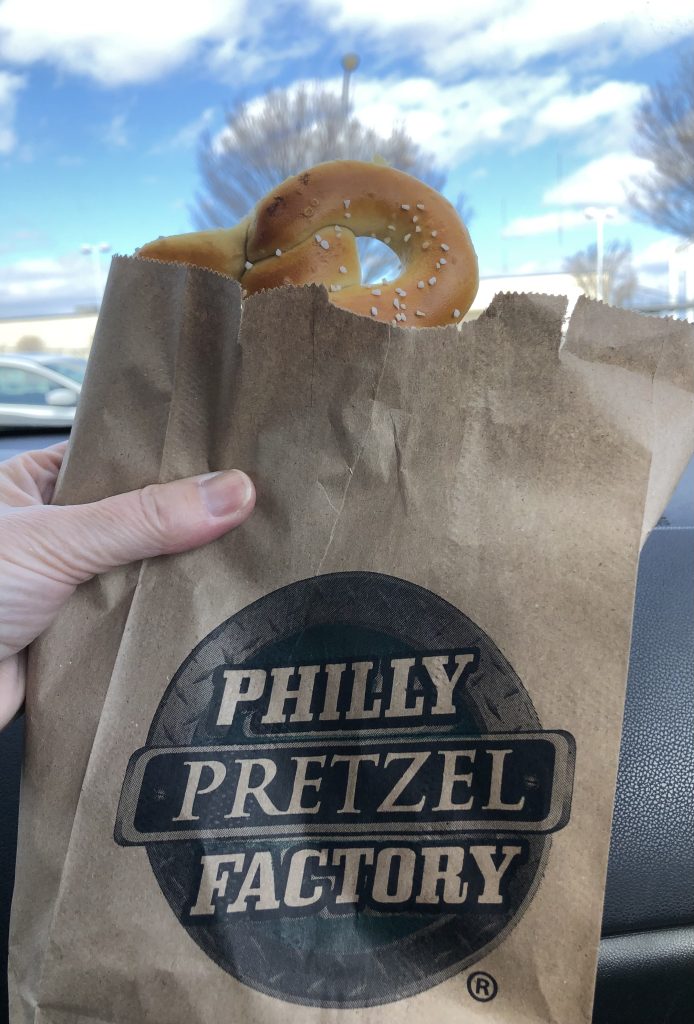

Soft Philly Pretzel and narrow cobblestone street
Historic Landmark Walk
Old City District
Our Airbnb was in the middle of the historic Old City District. It wasn’t exactly a “room with a view” as we looked straight into a large parking structure on one side and a concrete wall on the other. However, it was a great location for walking around Philadelphia.
When we arrived the night before, it was cold and dark with a heavy snowfall, but the next morning the snow was gone, and the sky was blue. What I loved the most about Philadelphia was the feeling of stepping into a whole different era as soon as I opened the front door.
I grabbed breakfast at Eggcellent Café, a cute little place across from our Airbnb. Then I started exploring the historic landmarks which were all located on or close to Chestnut Street. The Old City District is a must-visit, especially if you are interested in American history and the Revolutionary War. It’s a beautiful and interesting place to explore even if you are not that into American history.
A few minutes from the café, I made a stop at the Irish Memorial An Gorta Mor (The Great Hunger Monument) next to the Delaware River. A large bronze statue in remembrance of the hardship faced by Irish immigrants and their contribution to American society.
Row Houses
First, I walked along the Delaware River to Elfreth’s Alley, the oldest continuously lived-on-street in the original American colonies. The charm and authenticity of the many historic row houses were some of my favorites. The narrow red brick facades, with colorful wooden front doors and shutters, and brass door knockers were gorgeous. Row Houses can be found in many neighborhoods around Philadelphia but the homes in Elfreth’s Alley are really special.

Elfreth’s Alley
Next stop, Betsy Ross House just a few minutes walk from Elfreth’s Alley. Betsy Ross was the seamstress who sewed the first American flag in 1776. Her 18th-century home is a Philadelphia landmark, where you can learn about her life and accomplishments on a tour of the Betsy Ross House.
The colonial craftsmanship of the Christ Church can be seen from almost anywhere in Old City. The church is considered one of the most beautiful surviving 18th-century structures in the United States. Its 196-foot steeple served as a landmark for ships approaching Philadelphia. Christ Church Burial Ground is located a few blocks away and is the final resting place of Benjamin Franklin.
Just a cute little stop in the neighborhood, the B. Free Franklin Post Office. Here you can send a postcard with a hand-canceled stamp with the Postmaster Benjamin Franklin’s cancellation – “B. Free Franklin.”

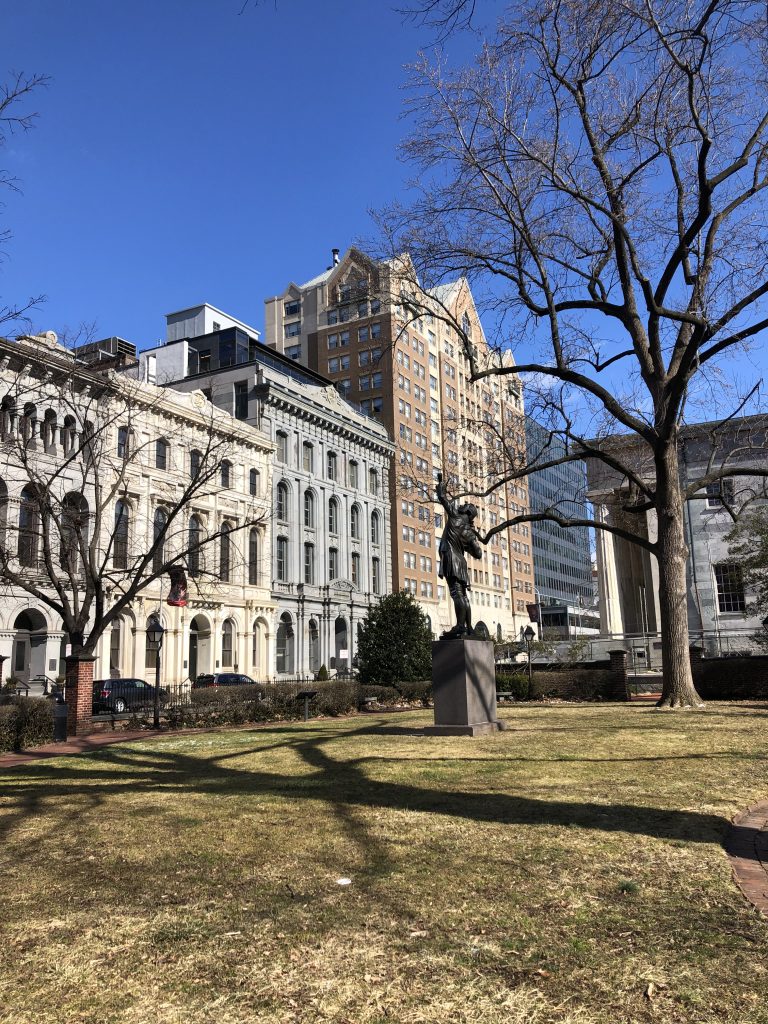
Old City District in Philadelphia
Carpenters Hall
Back on Chestnut Street, I passed the beautiful Carpenters Hall. Again I admired the Georgian-style red brick facade with the white trim and the large Palladian Windows. This place was the official birthplace of the Commonwealth of Pennsylvania where the First Continental Congress was held in 1774. Carpenters Hall is part of the Independence National Historic Park, which includes Independence Hall and the Liberty Bell.

Independence Hall
Memories
Almost 30 years prior I had worked as an au pair in Ohio. My host family took me to Philadelphia for my first 4th of July celebration. I had a vague memory of seeing these historic sites before, but what I remembered the most was patriotic displays, huge colorful floats, marching bands, and people cheering and waving flags. The Wava Welcome America Parade is an important part of the Independence Day celebration in Philadelphia. Even though it seemed hard to believe so many years later, – I had once been a part of that celebration.
Independence Hall
Independence Hall is maybe the most iconic historic building in the Old City District. Like Carpenters Hall, it is built in Georgian style and the contrasting effect of the white trim against the red bricks is stunning. This is where the Declaration of Independence was signed in 1776 and 11 years later the US Constitution. A steeple-like bell tower at the top of Independence Hall is where the Liberty Bell used to ring.
The most famous bell in America, the Liberty Bell, is easily recognized by its large crack. It is now on display at the Liberty Bell Center, across the street. Self-guided exhibits and knowledgeable park rangers will teach you more about this enduring symbol of American freedom and independence. Always something new to learn!
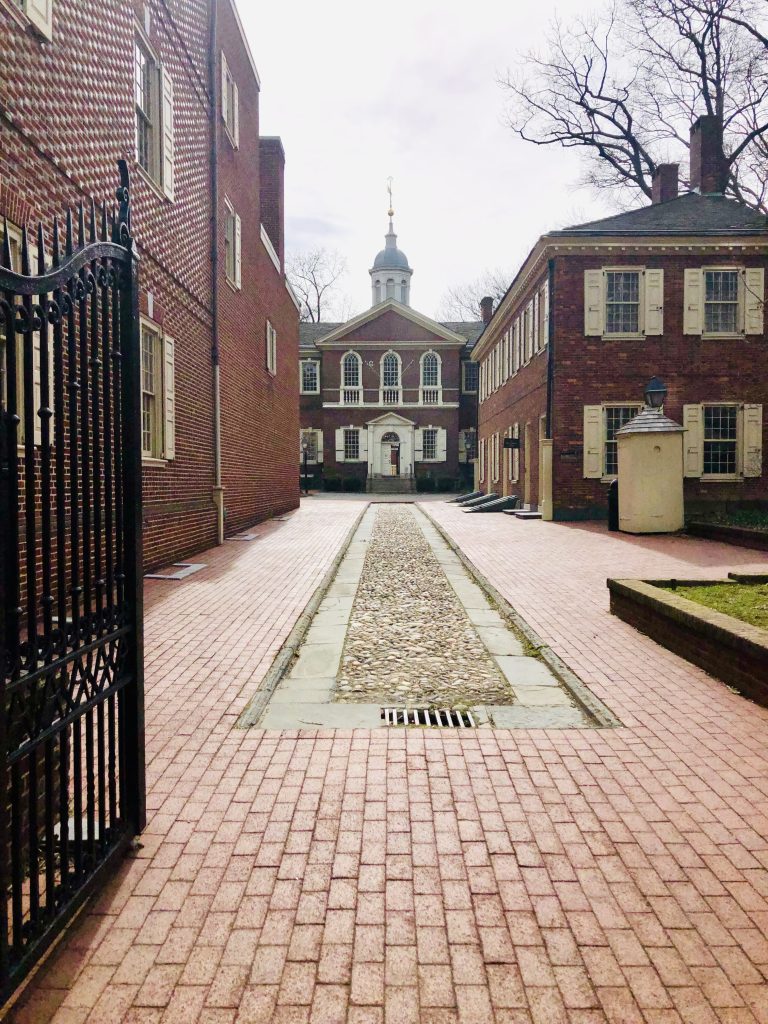
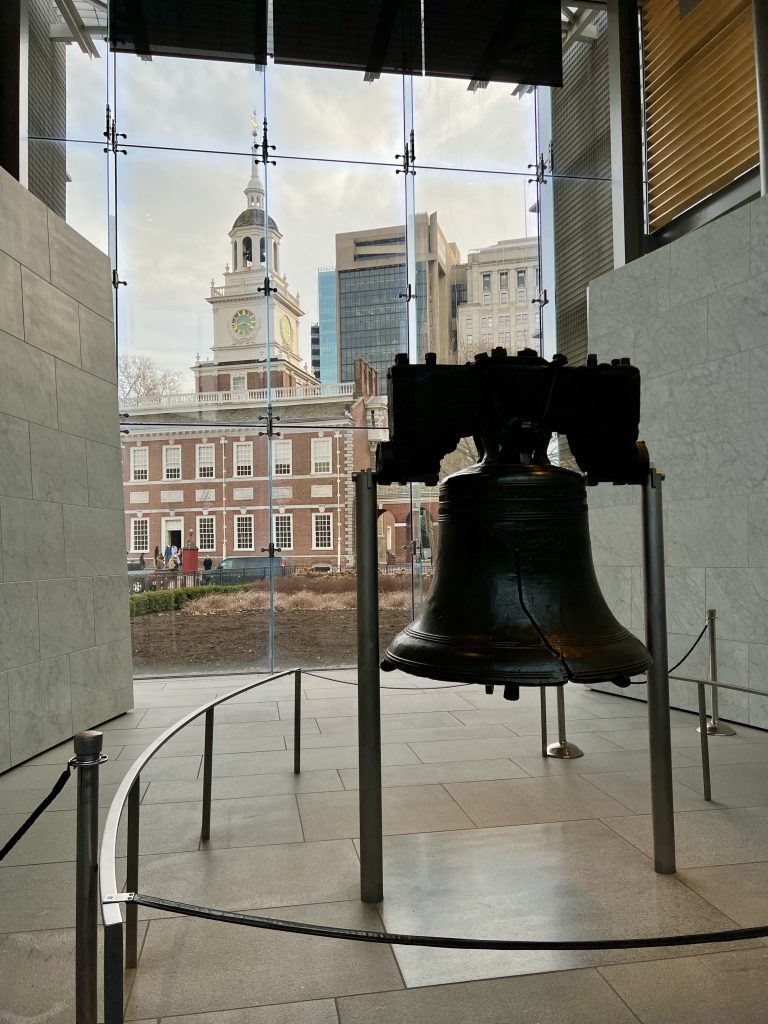
Carpenter Hall and The Liberty Bell at the Liberty Bell Center
If you like museums there are several other options in the Old City District, like the Museum of the American Revolution, The Benjamin Franklin Museum, and The African American Museum, The Second Bank of the United States, has a collection of more than 150 portraits of prominent Americans, and might be worth exploring as well.
Mural Walk
Mural Capital of the World
The Old City District is a special experience with historic sites you won’t find anywhere else. However, I love how Philadelphia takes you back in time and seeps you into history in many other ways. The most fascinating in my opinion is through street art. There are so many good reasons that Philadelphia is called the “Mural Capital of the World”. With more than 4,000 murals this city takes street art to a whole different level.
The Walking Tour
There are several guided or self-guided mural walking tours in Philadelphia. I researched what murals I wanted to see and put together my own walking tour. First, I walked to the Reading Terminal Market, then south on 13th Street where I zig-zagged through the smaller side streets down to South Street. Walking east on South Street I looped back through Society Hill and Head House Square back to Chestnut Street. This probably won’t make any sense unless you are there, but just to give you an idea of a great area to explore if you plan to visit Philadelphia. More details below!

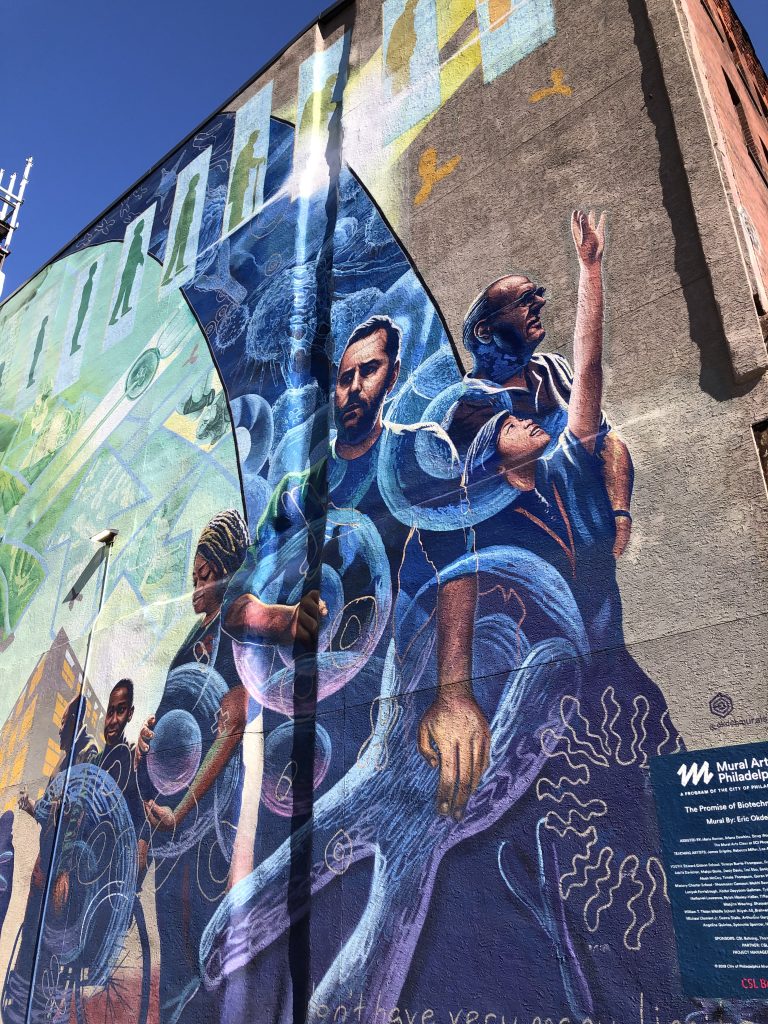


“Legacy” Mural
Visual and Social Impact
The murals tell stories of Philadelphia’s diverse cultural history, social issues, and community spirit in a very large-scale, public way. They educate about the past and the present, build a sense of belonging and pride in the community, and create a lasting visual impact for many people.
Many of the murals capture historical events and celebrate the cultural heritage of Philadelphia by portraying influential figures like Benjamin Franklin or important moments in the Civil Rights Movement. Other murals address contemporary social and political issues such as racial equality, economic disparity, immigration, and justice. They often feature a wide range of cultural and ethnic backgrounds, reflecting Philadelphia’s diversity.
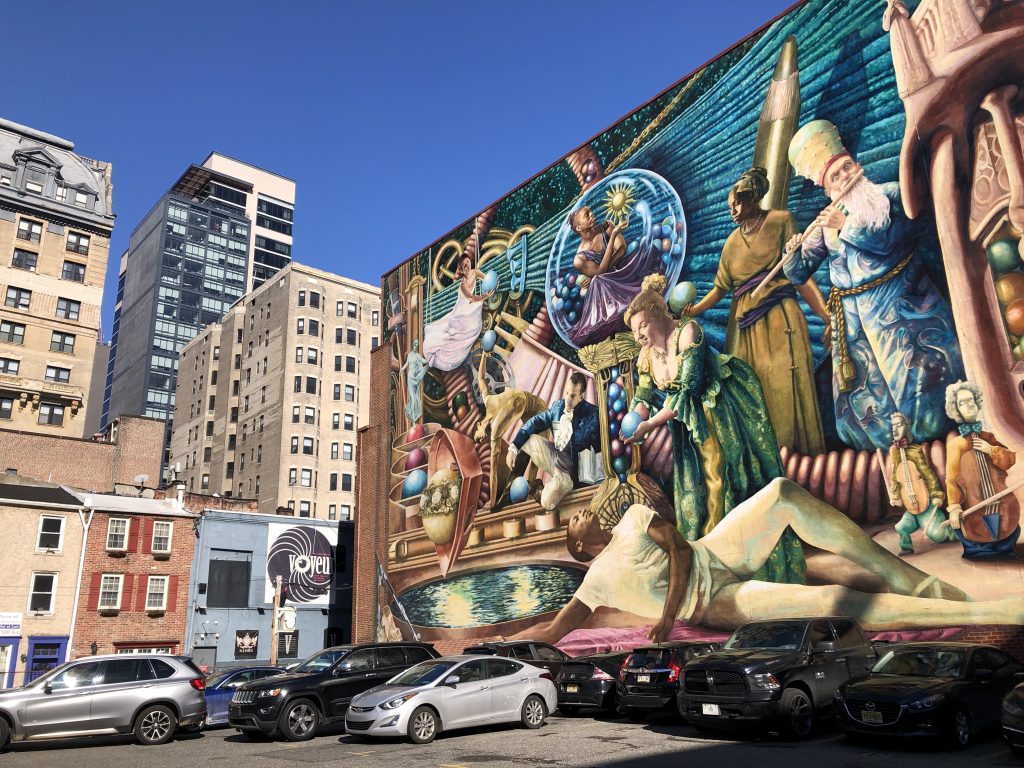
“Philadelphia Muses” Mural
Hope and Community
I was touched and awe-inspired by the strong community-driven aspect of street art in Philadelphia. Organizations like the Mural Arts Philadelphia Program facilitate many of these projects focusing on social impact and community engagement. Not only are the murals an amazing display of colors often mixed with mosaic art in a way that I hadn’t seen before, but they also provoke thought, celebrate diversity, and are an inspiration for hope and community.
Reading Terminal Market
I’m a huge fan of repurposing old buildings and the Reading Terminal is no exception. What used to be part of the old Reading Railroad Terminal is now a vibrant public market, Reading Terminal Market. A classic red-brick façade with arched windows and ornate detailing typical for the 19th century.
The high industrial ceilings, exposed beams, and beautiful vintage signs instantly took me back to that era. I wandered through a labyrinth of narrow aisles with colorful displays of fresh produce, meats, seafood, and baked goods. Strong aromas from all over the world filled the air and made me want to try everything. The whole place buzzed with energy from vendors calling out orders and the chatter of shoppers. Again, I had a sense of stepping back in time; and mixing history with food is not a bad thing.
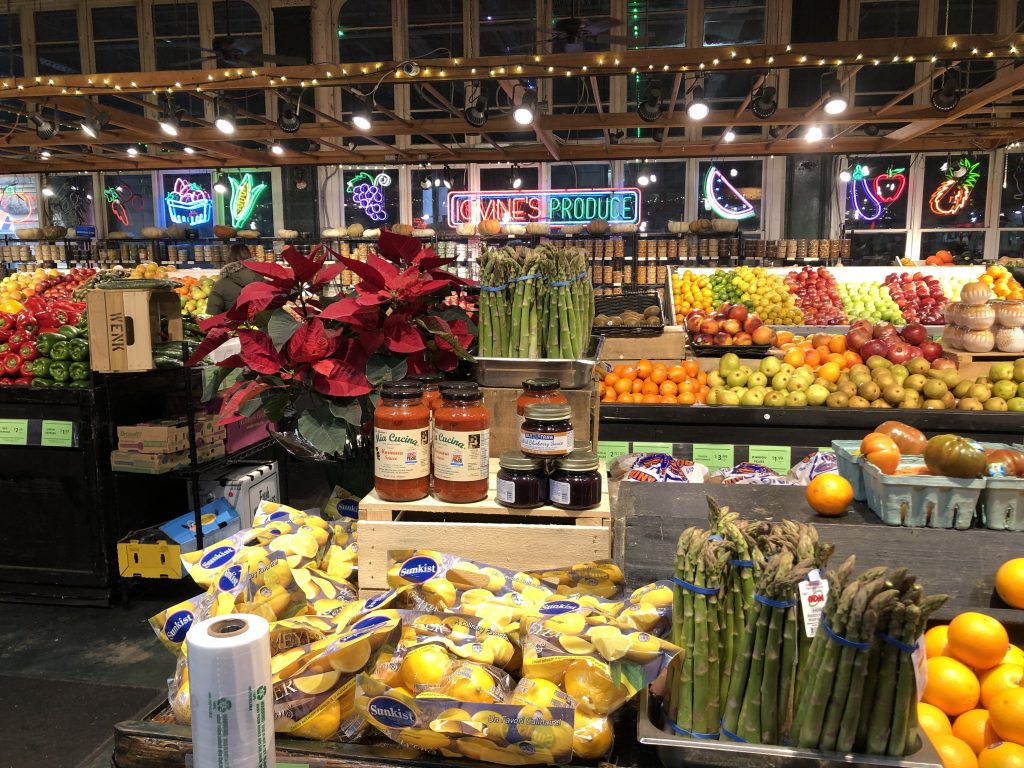
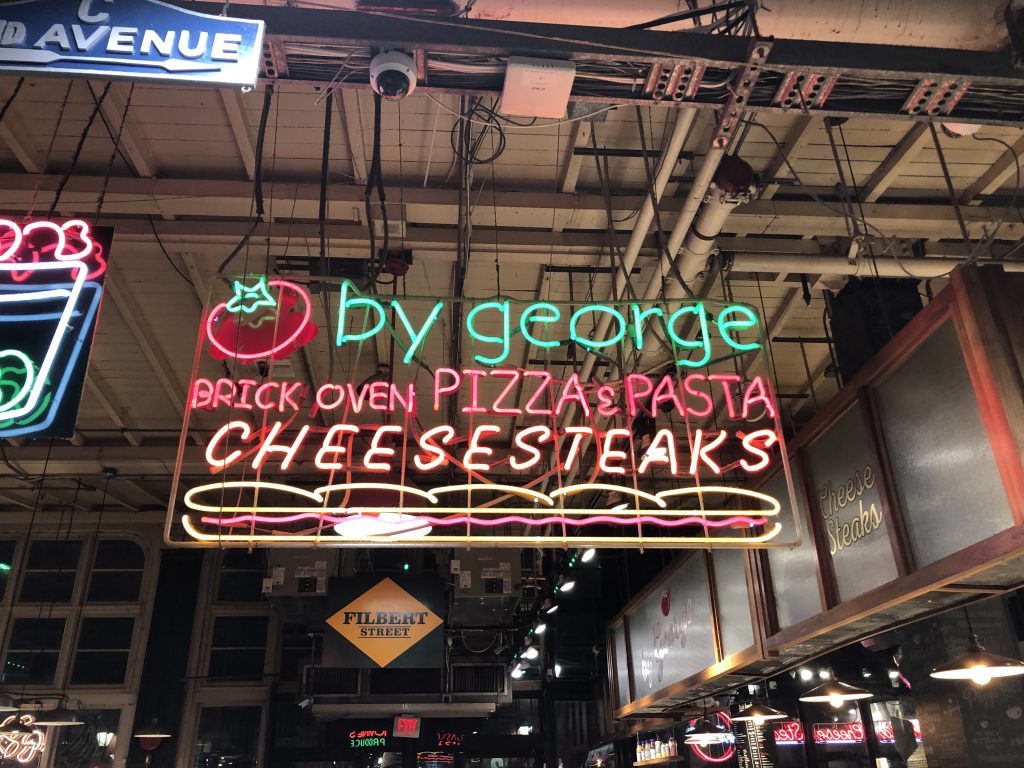
Reading Terminal Market
City Hall
Only a 5-minute walk from the Reading Terminal Market I reached the Philadelphia City Hall. The elaborate building dominated the city center with ornate carvings, sculptures, and decorative columns. A central clock tower with an iconic statue of William Penn rising to a height of 548 feet was the most striking feature of the City Hall.

City Hall
Magic Gardens
From City Hall, I headed south on 13th Street hunting for as many murals as I could find, on my way to Philadelphia’s Magic Gardens on South Street. Magic Gardens is another example of an urban space built from repurposed materials. However, this immersive mixed-media art environment is a whimsical wonderland of mosaics made from all sorts of materials such as bottles, tiles, bicycle wheels, mirrors, and many other things. The mosaics create intricate and colorful patterns that cover every surface of the place. It spans about half a block and includes an indoor gallery and an outdoor labyrinth of mosaic art. It’s kind of crazy and fascinating at the same time and a great place to take pictures.


Magic Gardens

Building with mosaic on South Street
South Street
I’m fascinated by anything that doesn’t fit the ordinary cookie cutter, so that makes South Street perfect in my optics. This street celebrates uniqueness, creativity, and individuality that stands out from conventional norms. Sure, some of the quirky specialty shops, vintage stores, and music venues had seen better days but the eclectic and bohemian atmosphere definitely made South Street worth exploring. The street has a wide range of restaurants, bars, and clubs. However, it’s known as a melting pot of different groups and cultures and for being a bit edgy, so be aware that the nightlife here can be lively.
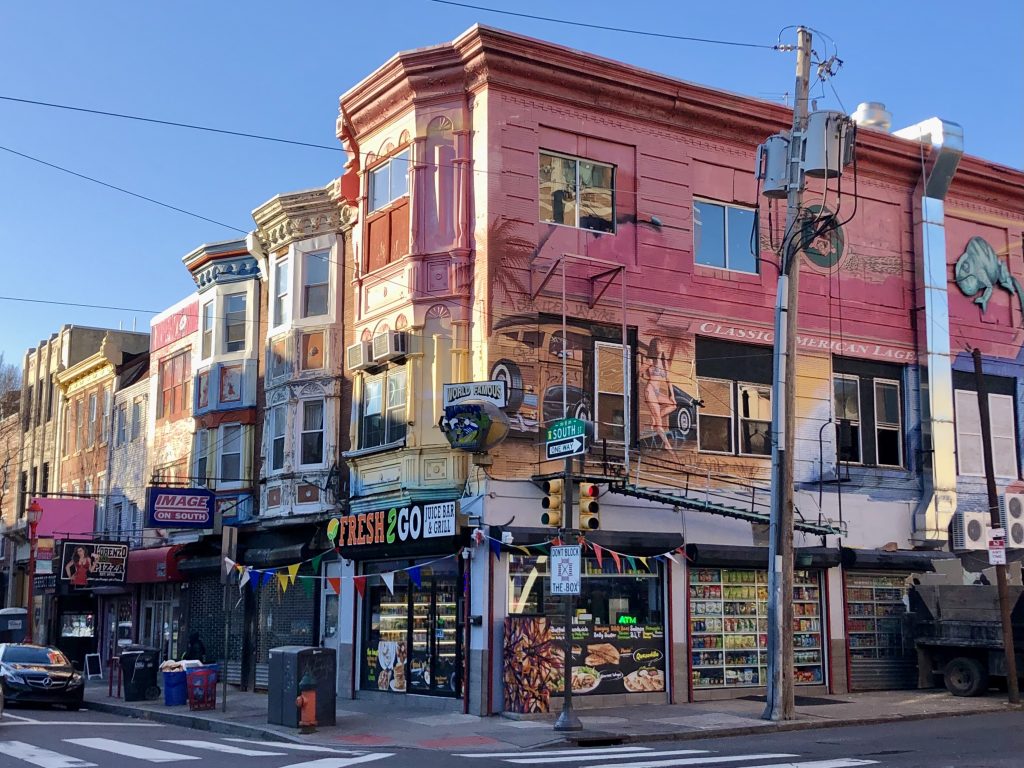
South Street
Society Hill
Looping back to Chestnut Street through Society Hill, another historic and picturesque neighborhood in Philadelphia. The well-preserved Georgian and Federal-style row houses, cobblestone streets, and overall charm make it perfect for a walk through the neighborhood. Later in the evening Allan and I returned to Society Hill and had dinner at one of the cute restaurants surrounding Head House Square.
Extended Walk Option
Here is another option if you want to do a 35-minute walk west from the Reading Terminal Market to the Philadelphia Museum of Art. The museum is a must-visit for several reasons besides being one of the largest and most renowned art museums in the United States. Its prominent position on a slight hill ensures that the amazing façade and iconic columns can be seen all the way down Benjamin Franklin Parkway.
Rocky Steps
Leading up to the museum are the famous “Rocky Steps”. These steps were popularized by the legendary movie “Rocky”, where Rocky runs through the streets of Philadelphia before he ascends the 72 steps and triumphantly raises his arms. At the bottom of the stairs, we took pictures of the Rocky Statue, the favorite fictional son of the “City of Brotherly Love”.

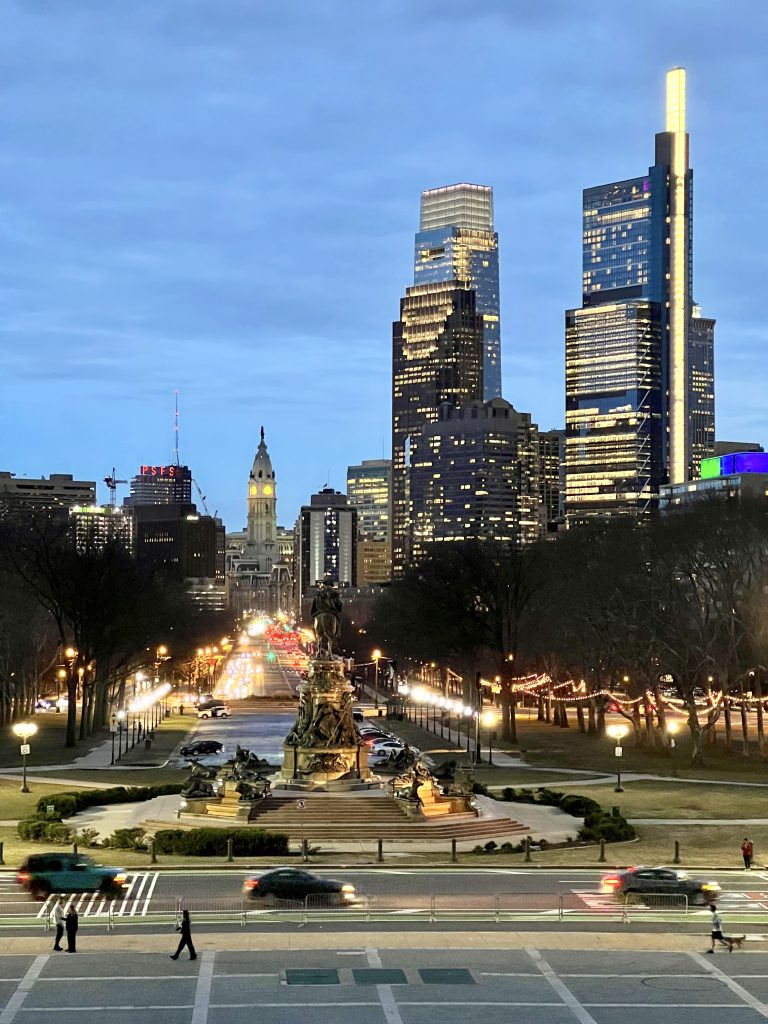
Rocky Statue and the Philadelphia skyline
I tried to make Allan do a reenactment of Rocky’s triumphant run up the steps but without luck. We reached the top a little after sunset (not a big deal climbing the steps, we just came late) where the city lights created a sweeping view of the Washington Monument Fountain and down Benjamin Franklin Parkway. We sat at the top of the stairs for a while and just admired the Philadelphia skyline. Landmarks such as City Hall, the Franklin Institute, and the Rodin Museum were beautifully illuminated.
This was our last night in Philadelphia before we moved on to Marietta in Georgia. But first, we made a stop at Oh Brother and had Philly Cheesesteaks with parmesan fries and milkshakes.
Read More
If you’re interested in reading more about our midlife journey across the US, check out the travel journal
Trying to navigate midlife? Read more in the midlife journal

